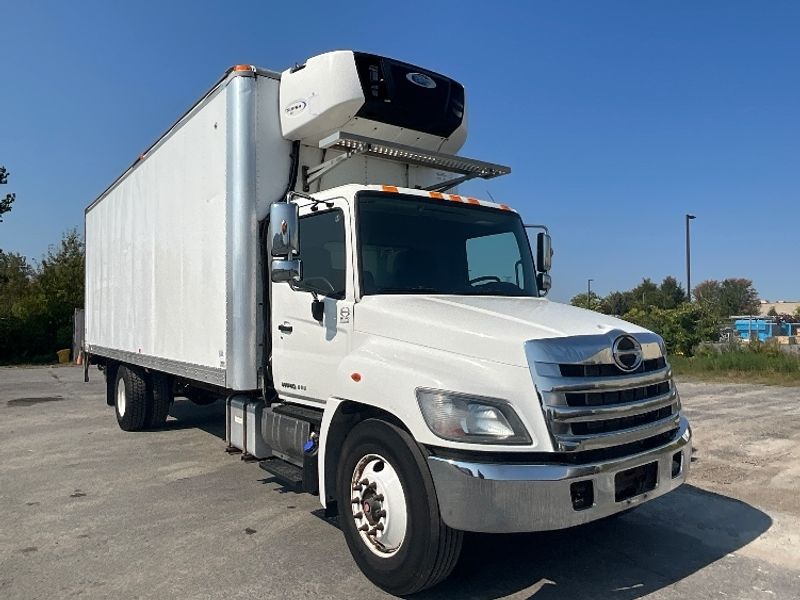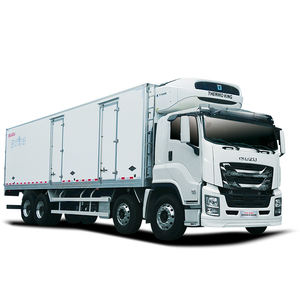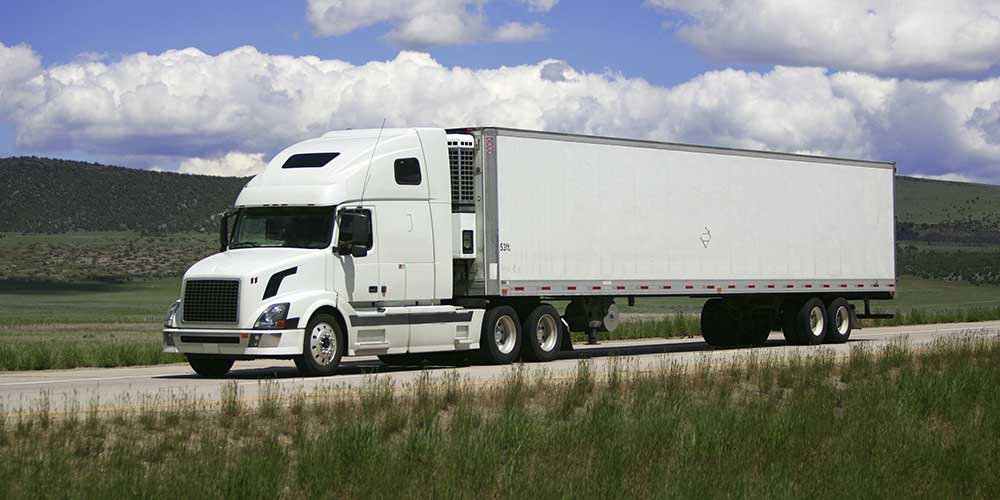Thermo King Transport Refrigeration: Trusted Solutions for Cold Chain
Thermo King Transport Refrigeration: Trusted Solutions for Cold Chain
Blog Article
Selecting the Right Transportation Refrigeration System for Your Fleet
Picking an appropriate transport refrigeration system for your fleet is a crucial choice that can dramatically affect operational efficiency and product honesty. It necessitates an extensive understanding of your certain refrigeration demands, consisting of temperature requirements and delivery timetables.
Comprehending Your Refrigeration Requirements
When choosing a transport refrigeration system, understanding your details refrigeration requirements is paramount to ensuring product high quality and compliance with industry standards. Different aspects should be considered to determine the most ideal system for your operation. These include the sort of products being transferred, their temperature level requirements, and the duration of transit.
For perishable products, such as fresh fruit and vegetables or drugs, exact temperature control is essential. Recognizing the temperature variety needed for every item enables the selection of a system that can keep those problems constantly. Additionally, think about the frequency of distributions and the range traveled; longer journeys may demand systems with enhanced insulation or back-up power alternatives to stop temperature level changes.

Moreover, the ability of the refrigeration device ought to align with your load dimension. By extensively assessing these elements, you can make sure that your selected transportation refrigeration system effectively satisfies your functional demands and keeps item stability.
Types of Transport Refrigeration Systems
Choosing the appropriate type of transportation refrigeration system is important for guaranteeing the secure transit of temperature-sensitive items. There are several systems available, each designed to fulfill specific requirements and applications.
The most typical types consist of direct development (DX) systems, which utilize cooling agent to soak up warmth and cool down the freight location successfully. These systems are frequently favored for their efficiency and reduced preliminary costs. An additional option is the main refrigeration system, which offers several areas or cars from a single compressor system. This is especially advantageous for bigger fleets calling for consistent temperature control throughout numerous transport units.
In addition, there are self-contained refrigeration units that combine the compressor and evaporator in one package. These devices are suitable for smaller cars or when area is limited. For specialized applications, such as transporting drugs or perishables, cryogenic refrigeration systems may be used, using fluid nitrogen or carbon dioxide to maintain ultra-low temperature levels.
Finally, hybrid refrigeration systems that combine diesel and electrical power are coming to be significantly popular, using adaptability in energy use and reducing ecological impact. Recognizing these different kinds permits fleet drivers to make enlightened choices tailored to their specific operational requirements.
Secret Attributes to Take Into Consideration
Exactly how can one guarantee that a transport refrigeration system satisfies all operational requirements? To achieve this, several essential functions must be carefully evaluated. Temperature control is essential; systems need to supply precise temperature level setups to fit numerous items, ranging from iced up goods to perishable products.
Energy performance is an additional crucial consideration, as it influences functional costs. Look for systems that use sophisticated modern technology, such as variable speed compressors, to enhance energy use without jeopardizing efficiency.
One more attribute to assess is the reliability and durability of the tools. Systems created from high-grade you can try these out materials and made for durability against severe problems will certainly minimize upkeep expenses and downtime.
Moreover, the convenience of upkeep and availability of components can dramatically influence functional performance (reefer trucks thermo king). Functions like modular styles or remote surveillance capabilities can simplify solution procedures
Lastly, compatibility with existing fleet monitoring software application can boost tracking and reporting processes. By concentrating on these essential attributes, fleet drivers can make sure that their transportation refrigeration systems not just satisfy current demands but likewise adapt to future needs.

Budgeting for Refrigeration Solutions
Reviewing crucial attributes of transport refrigeration systems is just one component of ensuring operational effectiveness; budgeting for refrigeration solutions is similarly crucial. A well-structured budget plan not just encompasses the first purchase rate however likewise considers long-lasting operational costs, including energy usage, upkeep, and possible repair work demands.
When developing a budget, fleet managers should initially assess the total expense of possession (TCO) This includes not just the purchase costs however additionally continuous expenditures connected to sustain efficiency and the sturdiness of the refrigeration systems. Selecting systems with higher energy performance ratings might yield significant savings over time, mitigating ahead of time expenses.
Moreover, fleet drivers ought to make up potential scalability. As businesses grow, the refrigeration needs might change, requiring upgrades or additional units. Planning for these future expenditures can avoid monetary stress.
Funding choices can also play a vital role in budgeting. Leasing, lendings, or straight-out purchases each have unique economic ramifications, and understanding these can aid in making an educated choice. Eventually, a thorough budget plan that considers both immediate and future requirements guarantees that transportation refrigeration systems contribute favorably to the overall functional effectiveness of the fleet.
Upkeep and Support Choices
In the world of transportation refrigeration systems, efficient upkeep and assistance options are important for ensuring optimum performance and durability. Normal upkeep is vital to protect against malfunctions and maintain the stability of temperature-sensitive freight. It is recommended to develop a regular examination timetable with qualified professionals that can carry out necessary checks and fixings on refrigeration systems.
Support options must include a durable solution arrangement, covering both regular upkeep and emergency situation repair work. This makes sure that your fleet has accessibility to motivate assistance, decreasing downtime and preserving operational effectiveness. Lots of suppliers supply detailed assistance plans that include training for your personnel, allowing them to execute standard troubleshooting and upkeep tasks.
Moreover, making use of remote tracking technology can enhance your upkeep strategy - reefer trucks thermo king. These systems offer real-time data on temperature level and performance, enabling aggressive actions before issues rise. Purchasing training and modern technology not only improves your fleet's reliability but also prolongs click here now the lifespan of your refrigeration systems
Ultimately, a critical technique to upkeep and assistance will guard your financial investment and make certain that your transport refrigeration systems operate at peak efficiency, providing consistent results for your business.

Verdict
Finally, selecting the suitable transportation refrigeration system for a fleet necessitates a complete examination of details refrigeration needs, system types, and important functions. Prioritizing functional effectiveness, energy consumption, and upkeep factors to consider is critical for making certain reliability. Furthermore, mindful budgeting and preparation for informative post future scalability will certainly add to the lasting success of the refrigeration method. Ultimately, a knowledgeable decision will certainly boost product stability and enhance general logistics procedures within the fleet.
Picking an ideal transport refrigeration system for your fleet is an essential decision that can substantially influence functional performance and product stability.When picking a transportation refrigeration system, recognizing your certain refrigeration requirements is vital to making sure item top quality and conformity with industry requirements. By completely assessing these factors, you can make certain that your picked transport refrigeration system successfully satisfies your functional requirements and keeps item honesty.
Eventually, a thorough budget plan that considers both future and prompt needs guarantees that transportation refrigeration systems add positively to the overall functional efficiency of the fleet.
In verdict, choosing the suitable transportation refrigeration system for a fleet requires a detailed evaluation of particular refrigeration requirements, system types, and crucial attributes.
Report this page